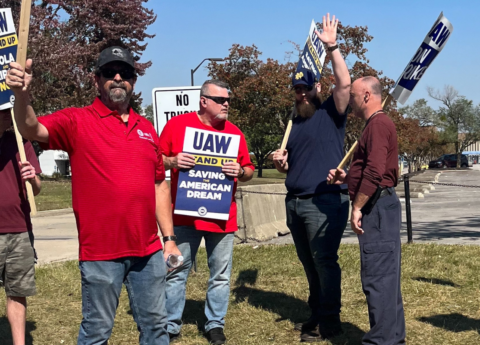Acknowledging the disparate infection and death rates for Black Kentuckians from the COVID-19 pandemic, last week Governor Andy Beshear committed to ensuring that all Black Kentuckians have health coverage. The pledge has come under scrutiny from a few for its focus on addressing the disproportionate barriers to coverage and care that Black Kentuckians face instead of on equal treatment for people of all races.
But Angela Glover Blackwell, founder and president of the research institute PolicyLink, sheds light on why an equity focus is good for us all. In a 2017 article, Blackwell explained how when disability advocates poured a crude concrete ramp on a curb in the 1970s – with hundreds more ramps following – the improvement for people living with disabilities (people facing literal barriers to using sidewalks and crossing streets) ended up increasing mobility for “parents pushing strollers…workers pushing heavy carts, business travelers wheeling luggage, even runners and skateboarders” as well.
Called the “curb-cut effect,” this concept illustrates how “opportunity doesn’t trickle down, it cascades out and up.”
Increasing public awareness of existing health coverage options and making options more affordable will insure more Black Kentuckians – people who face among the most significant barriers to coverage – and result in more people of all races getting covered. We saw this effect in 2014 when Medicaid was expanded in Kentucky. As much as a third of the coverage gains came from signing up people who were already eligible for traditional Medicaid but hadn’t been enrolled. This “woodwork effect” from putting out a welcome mat to the social safety net for those most left out ended up helping many more people. And through the healthcare jobs created from expanded coverage, it made our economy stronger for all.
Another pandemic-specific example of the curb-cut effect: Economists Jared Bernstein and Janelle Jones from the Groundwork Collaborative have proposed that the Federal Reserve should base its policy decisions on the unemployment rate for Black Americans instead of the overall rate. Why?
A long history of racist policies like slavery, Jim Crow, and white-favoring hiring practices, tax policies and labor standards has led to Black people being disproportionately underemployed compared to white people. Current data shows, for example, that Black Kentuckians are experiencing job loss at a higher rate in the pandemic than white Kentuckians. According to Department of Labor data for April of this year, Black Kentuckians made up 12.4% of those who received unemployment insurance (UI) benefits even though they make up only 9.8% of workers whose employer pays for UI – or are “covered.” By comparison, white Kentuckians made up 85.0% of claimants, but 86.6% of covered workers. National employment data also shows that while the unemployment rate for white Americans ticked modestly downward in May, the unemployment rate for Black Americans continued to rise.
Tying the Fed’s monetary policy decisions during the recession and eventual recovery to the typically higher Black unemployment rate would also result in lower unemployment for people of other races than if the Fed used its conventional metric of the total unemployment rate. Targeting equity actually benefits us all.
Our fiscal policy response to the pandemic – the investments we make in community services and safety net systems that will get us through the crisis – will also be more effective if it reflects the greater barriers to well-being that people of color face. The same systemic, historic policy choices that have led to higher unemployment for Black Kentuckians have also led to substantial wage and wealth gaps, meaning Americans who are Black are less financially able, on average, to weather economic shocks like the pandemic than white people. Because Kentuckians of color are more likely to be unemployed during the recession, face food insecurity and struggle to pay bills, robust emergency federal aid is especially important to achieving racial justice.
And because our economy is driven primarily by consumer spending, the more we do to assist those struggling most through the crisis, the quicker and more fully we will achieve a robust recovery for all. Without significant, continued and even expanded federal assistance to individuals through boosted unemployment insurance benefits (set to expire July 31), direct stimulus payments and enhanced food assistance, and to states through further enhanced Medicaid funding and direct fiscal aid, Black Kentuckians will continue to bear a disparate share of the economic harm from COVID-19, and a weak economy will continue to deliver pain for everybody.
If we cut the proverbial curb on what it takes to weather this crisis for Black Kentuckians and others of us facing the greatest barriers, the benefits will cascade up and out across our communities and our economy. Our fates are tied together, and policies that take that into account make everyone better off.
Anna Baumann is Deputy Director and Dustin Pugel is Senior Policy Analyst at the Kentucky Center for Economic Policy.




